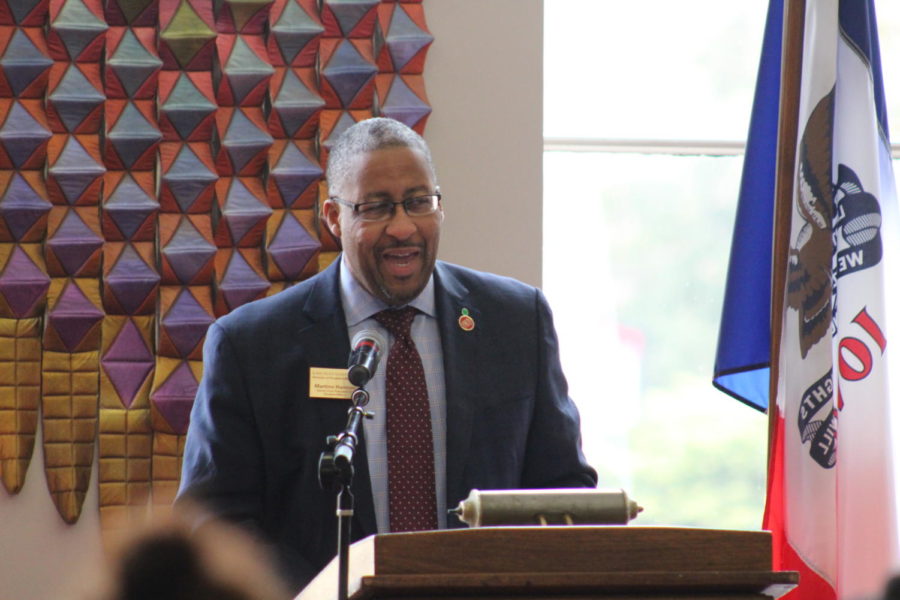Love in the time of COVID-19: Transitioning to a new lifestyle
Dr. Martino Harmon, the senior vice president for Student Affairs at Iowa State, welcomes everyone to the start of the 2019 Transforming Gender and Society Conference organized by the ISU Women’s and Gender Studies Program held in the Memorial Union on April 6, 2019. The conference touched on topics such as gender, sexuality, race, ethnicity and age with people gathering from various colleges to speak and attend.
May 19, 2020
Editor’s note: This is part of a contributed collection of students and faculty experience with COVID-19.
COVID-19 brought several transitions to Iowa State students, faculty and staff for the spring 2020 semester, whether academic or personal-life related.
Martino Harmon, senior vice president for Student Affairs, is leaving Iowa State in June. He said the challenges of COVID-19 had a big impact on the human spirit.
“The not having that connectedness that people would normally have, not seeing people,” Harmon said. “I think about students not being able to connect with the groups that they built a community with.”
Supplemental instruction and tutoring services have continued while students are taking virtual classes, but leaders and tutors had to adjust what resources they used to help the students learn while being engaged.
Carolyn White, senior in biological systems engineering, was a supplemental instruction leader for the fall 2019 and spring 2020 semesters. She said the tutoring and supplemental instruction sessions have been hosted via Webex, which is a video call platform.
White said there has been audio, video and internet connection difficulties but they’ve managed to address each technical issue that came up and were quick to figure it out.
To discuss the progress of the sessions and to look at difficulties, technical and otherwise, White said they have virtual meetings. She mentioned this was also a nice way to have some social interaction despite not being able to meet in person.
Something White said she took away from the virtual service experience was the strong leadership of the program. People were open and talked about the struggles they were facing because of the transition and challenges of COVID-19.
White was able to see her supervisors and others work hard to still provide Iowa State students with services despite having so many unknowns in their personal lives.
Brian Caskey, senior in aerospace engineering and supplemental instruction leader, always has his video on during his sessions to be more interactive during his sessions despite not having that in-person time.
For his sessions, Caskey kept them at the same time after transitioning online to stick with a schedule that is as close to normal as possible.
Caskey is a supplemental instruction leader for a calculus course. He said it can be hard because students can’t break off into groups to work together but they were able to use the chat feature on Webex.
The chat worked well for Caskey and his students because of it being easy to answer with the numbers to the problems presented as it was for a math course.
The supplemental instruction leaders all had their own methods to work with providing their service virtually to students. Caskey said while some may have typed up their answers and sent them before the sessions, others may have used whiteboard apps to “write” on the screen.
“I feel I’ve gotten more organized from the online classes because now I’m really forced to sit down and structure my day,” Caskey said. “As opposed to Iowa State would usually structure my day by giving me classes and telling me where to go and everything.”
Reya Mathew, junior in chemical engineering, tutors chemistry at Iowa State. She said it was up to the tutors to choose what resources and strategies worked best for them.
Mathew had chosen to use Webex for her tutoring sessions. She used a whiteboard app on her computer and shared her screen so the students could follow along.
“I don’t think it’s ideal for anyone to be online,” Mathew said. “But we have to do what we have to do.”
Though the transition to online classes and virtual services required people to adjust to their new day-to-day lives, Mathew said her tutoring sessions have continued to be pretty successful.
Though the supplemental instruction sessions have continued, there was a noticeable decrease in attendance for the virtual sessions. Caskey said after spring break it’s easy to fall out of a schedule because there’s no classes and then everyone went online.
“From the mentees that I work with, the number looks to be from a maximum of like 15 in a session to a maximum of 10,” White said. “That’s kind of on a higher range where a lower range might be a maximum of five and now some people aren’t seeing any attendance.”
Looking ahead to the future, Harmon said he hopes it is safe to see people in person when it comes time for him to say goodbye. He said he can relate to the graduating seniors as he may also be facing a departure without a proper goodbye.
Harmon said just like the students, he misses the university atmosphere with so many events and activities to participate in and being able to socialize with others.







